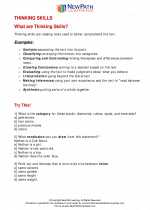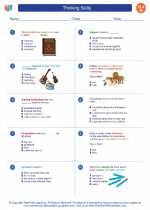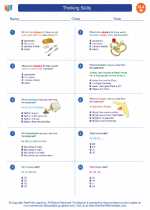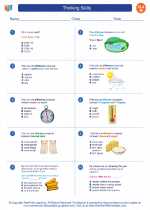Thinking Skills
What are Thinking Skills? Thinking skills are reading tools used to better comprehend the text. Examples: Analysis-separating the text into its parts; Classifying-arranging information into categories; Comparing and Contrasting-finding likenesses and differences between items; Drawing Conclusions-coming to a decision based on the text. Read More...
◂English Language Arts Worksheets and Study Guides Eighth Grade. Thinking Skills
Study Guide Thinking Skills
Thinking Skills  Worksheet/Answer key
Worksheet/Answer key Thinking Skills
Thinking Skills  Worksheet/Answer key
Worksheet/Answer key Thinking Skills
Thinking Skills  Worksheet/Answer key
Worksheet/Answer key Thinking Skills
Thinking Skills 

 Worksheet/Answer key
Worksheet/Answer key
 Worksheet/Answer key
Worksheet/Answer key
 Worksheet/Answer key
Worksheet/Answer key

The resources above cover the following skills:
Students read a wide range of literature from many periods in many genres to build an understanding of the many dimensions (e.g., philosophical, ethical, aesthetic) of human experience. (NCTE)
Students apply a wide range of strategies to comprehend, interpret, evaluate, and appreciate texts. They draw on their prior experience, their interactions with other readers and writers, their knowledge of word meaning and of other texts, their word identification strategies, and their understanding of textual features (e.g., sound-letter correspondence, sentence structure, context, graphics). (NCTE)
Students apply knowledge of language structure, language conventions (e.g., spelling and punctuation), media techniques, figurative language, and genre to create, critique, and discuss print and nonprint texts. (NCTE)
Students conduct research on issues and interests by generating ideas and questions, and by posing problems. They gather, evaluate, and synthesize data from a variety of sources (e.g., print and nonprint texts, artifacts, people) to communicate their discoveries in ways that suit their purpose and audience. (NCTE)
Students use a variety of technological and information resources (e.g., libraries, databases, computer networks, video) to gather and synthesize information and to create and communicate knowledge. (NCTE)